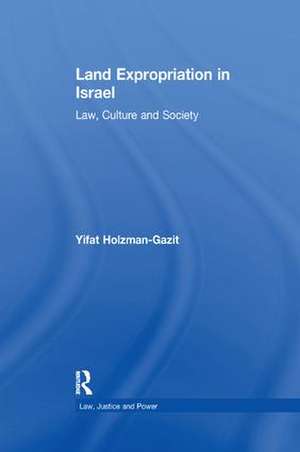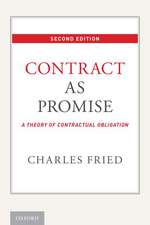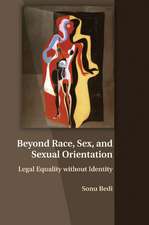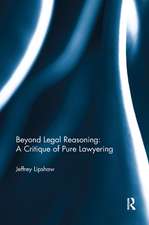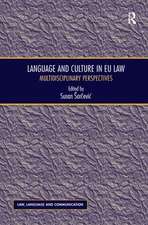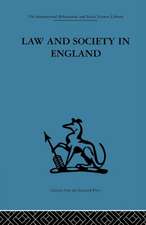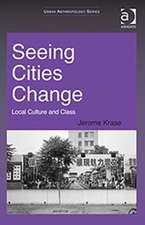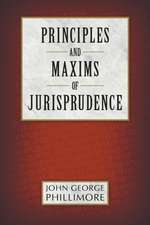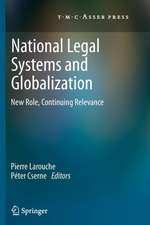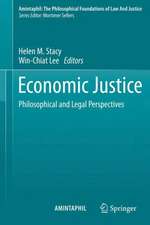Land Expropriation in Israel: Law, Culture and Society
Autor Yifat Holzman-Gaziten Limba Engleză Paperback – 6 mar 2017
| Toate formatele și edițiile | Preț | Express |
|---|---|---|
| Paperback (1) | 323.23 lei 6-8 săpt. | |
| Taylor & Francis – 6 mar 2017 | 323.23 lei 6-8 săpt. | |
| Hardback (1) | 698.17 lei 6-8 săpt. | |
| Taylor & Francis – 28 noi 2007 | 698.17 lei 6-8 săpt. |
Preț: 323.23 lei
Nou
Puncte Express: 485
Preț estimativ în valută:
61.86€ • 64.34$ • 51.07£
61.86€ • 64.34$ • 51.07£
Carte tipărită la comandă
Livrare economică 15-29 aprilie
Preluare comenzi: 021 569.72.76
Specificații
ISBN-13: 9781138249271
ISBN-10: 1138249270
Pagini: 218
Dimensiuni: 156 x 234 mm
Greutate: 0.45 kg
Ediția:1
Editura: Taylor & Francis
Colecția Routledge
Locul publicării:Oxford, United Kingdom
ISBN-10: 1138249270
Pagini: 218
Dimensiuni: 156 x 234 mm
Greutate: 0.45 kg
Ediția:1
Editura: Taylor & Francis
Colecția Routledge
Locul publicării:Oxford, United Kingdom
Notă biografică
Yifat Holzman-Gazit is a Visiting Professor of Law, at Stanford Law School, California, USA.
Recenzii
'Academically , Land Expropriation in Israel is important for two reasons. The first is its conclusion, drawn from previously overlooked quarters, that "the Jewish-Arab land struggle shaped the court's approach to property rights, not only in areas of high political and national tension such as Jerusalem and the Galilee, but created the pattern for expropriation adjudication throughout the country". The second is its conclusion "that the supreme court's considerable self-restraint...had not only its intended effect on land ownership in the Arab sector, but also an unintended parallel effect on the legal treatment of private land ownership and land expropriation in the Jewish sector". Scholarship has hitherto not addressed this dynamic, and this finding contributes to a more complete and nuanced understanding of the history of Israeli land-taking law.' Journal of Palestine Studies 'A very useful analysis of the history and sociology of Israeli land law. Crucial for students of state and nation building, of ideology and utopia and of the intersection between the Jewish and the Palestinian refugee problems in post 1948 Israel.' Pnina Lahav, Boston University School of Law, USA 'This is a deeply researched and carefully written case-study of law, politics, and land policy in Israel, especially land expropriation policy. Dr. Holzman-Gazit's book is important not only for those who are interested in the history of Israel, and those more generally concerned with unraveling the tangled skein of middle-eastern politics; it is also a dispassionate, insightful and illuminating exploration of the relationship between legal and political institutions, and the power and non-power of courts to affect policy in the modern world. Lawrence M. Friedman, Stanford Law School, USA. 'This is a first-rate study which places Israel's land expropriation laws in their political, social and cultural contexts. Holzman-Gazit provides a rich, lucid and non-partisan interpretation of the rela
Cuprins
Introduction; Chapter 1 The Statutory Framework of Expropriation and the Land Tenure Regime; Chapter 2 Civil Rights and Land Expropriation: Double Standard in the Court in the Pre-Constitutional Era; Chapter 3 Nation-Building and the Ideology of Public Land Ownership; Chapter 4 The Public Use Requirement: The Impact of Immigration and Housing Policies; Chapter 5 Expropriation of Arab Land in the 1950s: Policy and Process; Chapter 6 Expropriation of Arab Land as the Basis for a General Legal Practice; Chapter 7 The Politics of Land Expropriation after 1967; Chapter 8 The 1992 Constitutional Revolution: Continuity and Change; Chapter 9 New Millennium, New Directions?;
Descriere
This book studies the Israeli case law of land expropriation against the social characteristics, political realities and ideologies of Israel. It concludes with an analysis of the constitutional change of 1992 and its impact on the legal treatment of property rights under Israeli law.
